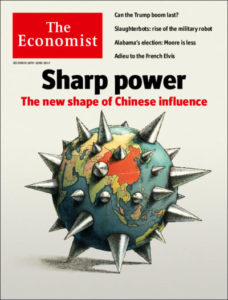 China is waging an unprecedented campaign to influence American public opinion as November congressional elections approach and presents the greatest long-term counterintelligence threat to the United States, U.S. security officials said on Wednesday, Reuters reports:
China is waging an unprecedented campaign to influence American public opinion as November congressional elections approach and presents the greatest long-term counterintelligence threat to the United States, U.S. security officials said on Wednesday, Reuters reports:
Senators on the Homeland Security Committee questioned Homeland Security Secretary Kirstjen Nielsen and FBI Director Christopher Wray about President Donald Trump’s assertion that China is interfering in U.S. elections and asked if Beijing poses a larger threat to the country than Moscow. Nielsen told the panel that there were two types of threats to American election security from other nation: hacking or disruption of election infrastructure, which includes voter registration lists or voting machines, and influence campaigns.
“China absolutely is on an unprecedented – or exerting unprecedented effort to influence American opinion,” said Nielsen. “We have not seen to date any Chinese attempts to compromise election infrastructure.”
“China in many ways represents the broadest, most complicated, most long-term counterintelligence threat we face,” said Wray. “Russia is in many ways fighting to stay relevant after the fall of the Soviet Union. They’re fighting today’s fight. China’s is fighting tomorrow’s fight.”
 A recent forum of the Institute for National Defense and Security Research (INDSR) on the threat of disinformation heard Chung Chien-peng, Professor of Politics at Hong Kong’s Lingnan University, describe Beijing’s “sharp power”, a newly fashionable term [coined by the National Endowment for Democracy], as “hard power in a soft power glove.”
A recent forum of the Institute for National Defense and Security Research (INDSR) on the threat of disinformation heard Chung Chien-peng, Professor of Politics at Hong Kong’s Lingnan University, describe Beijing’s “sharp power”, a newly fashionable term [coined by the National Endowment for Democracy], as “hard power in a soft power glove.”
China is viewed as an increasingly formidable challenger to the U.S.’ current dominance in artificial intelligence, and has laid out blueprints to become the world leader in AI by 2030, adds China Digital Times:
AI-powered facial recognition technologies in China have spurred the rise of a digital police state in Xinjiang, and are proliferating across China via the national Skynet and Sharp Eyes surveillance initiatives. Facial recognition is also used in areas such as ride-sharing, robotic package delivery, airport and college dorm security, and social credit schemes. One application that has drawn notable international attention was the facial recognition-powered naming and shaming of jaywalkers in Shenzhen.
Hong Kong’s expulsion of a British journalist after he led a foreign correspondents’ meeting with a pro-independence activist is, first and foremost, an attempt by Beijing to tamp down any dissent in the former British colony, The New York Times adds:
Hong Kong officials have not given a reason for rejecting a journalist visa for Victor Mallet, the Asia news editor for The Financial Times. China’s only comment has been that Hong Kong authorities are within their right to do so. But that’s the typical legalistic evasiveness of authoritarian regimes when they do something they know is hard and embarrassing to defend.







